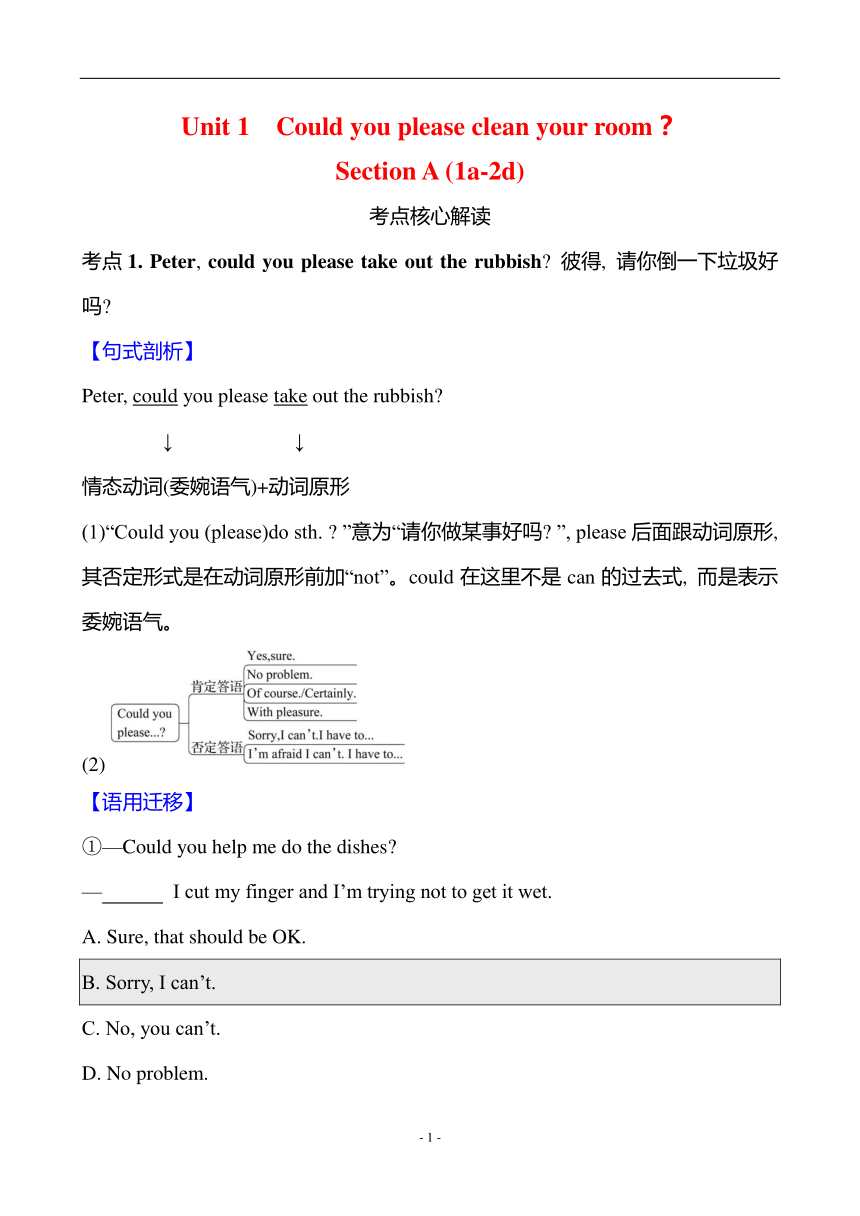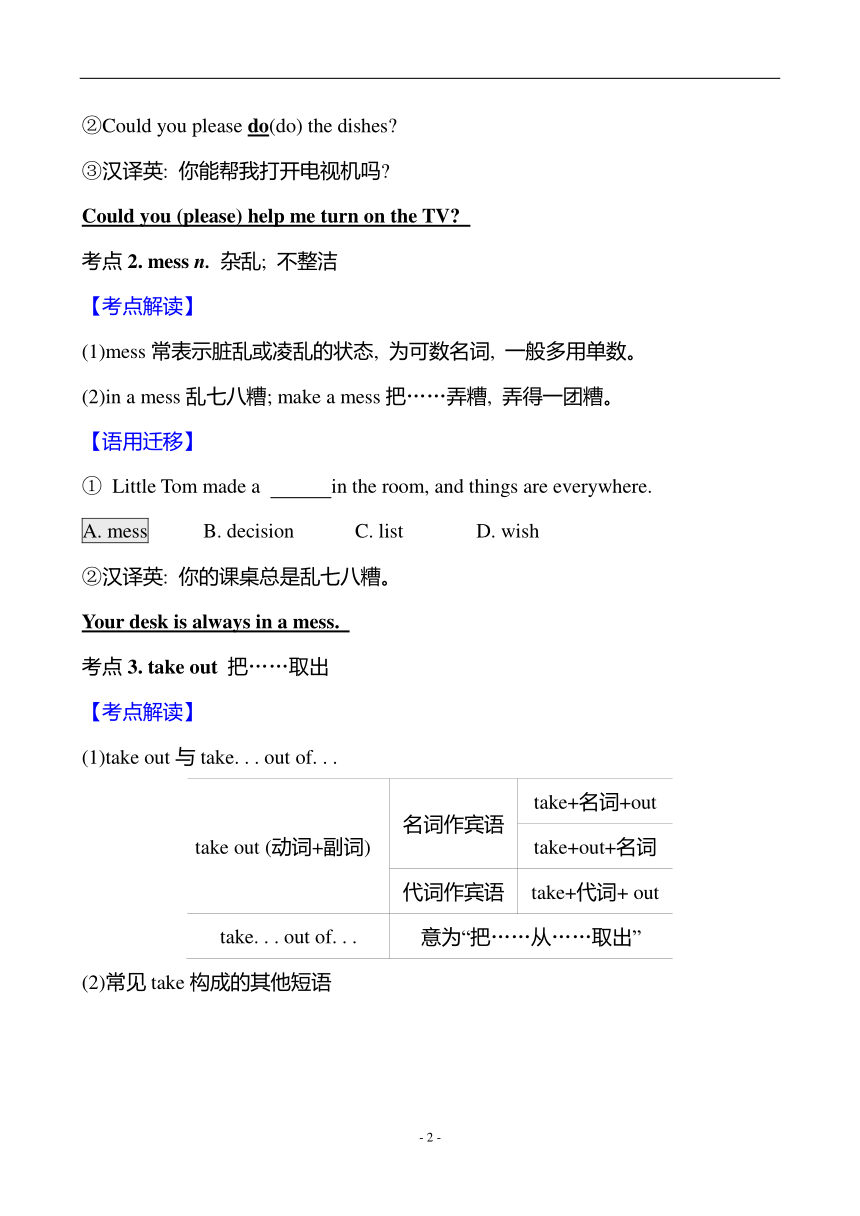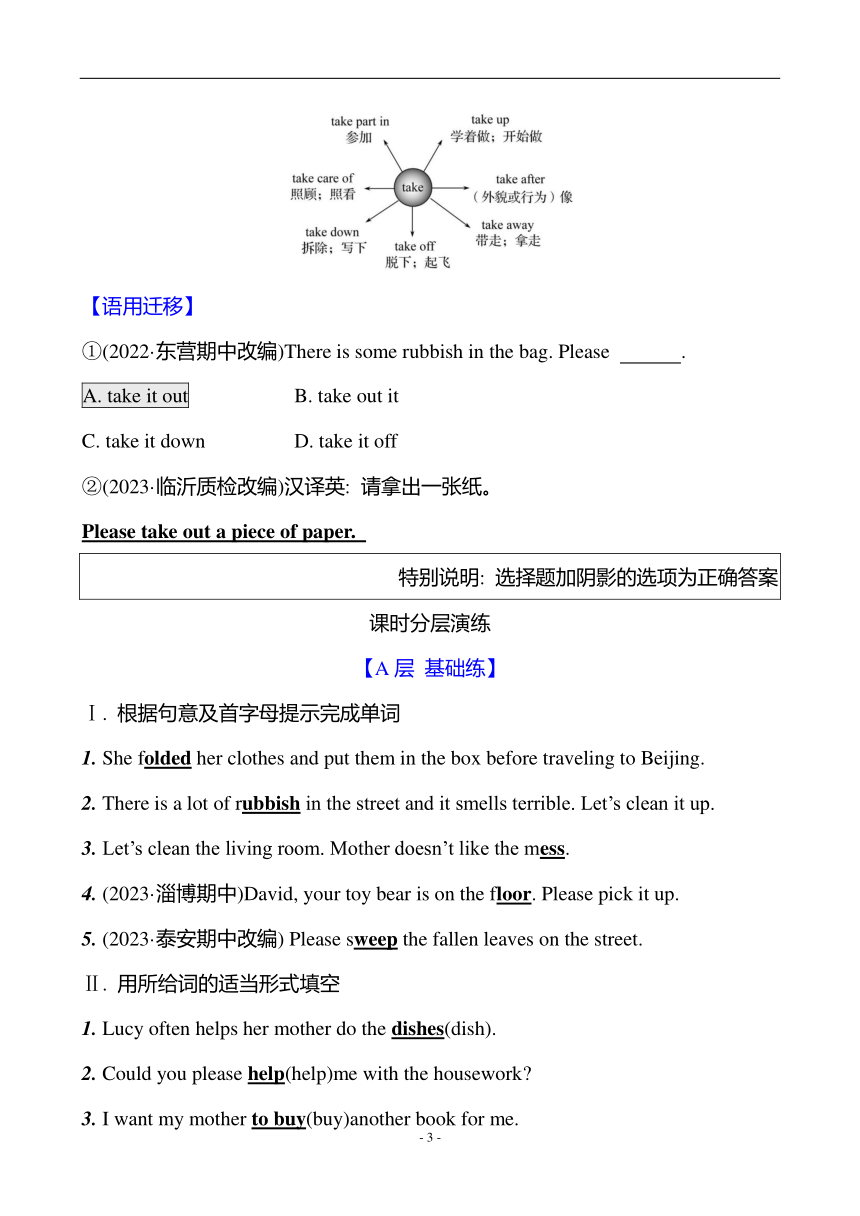Unit 1 Could you please clean your room?Section A (1a-2d) 学案 2024-2025学年英语鲁教版八年级上册
文档属性
| 名称 | Unit 1 Could you please clean your room?Section A (1a-2d) 学案 2024-2025学年英语鲁教版八年级上册 |

|
|
| 格式 | docx | ||
| 文件大小 | 112.3KB | ||
| 资源类型 | 教案 | ||
| 版本资源 | 鲁教版 | ||
| 科目 | 英语 | ||
| 更新时间 | 2024-06-13 11:38:47 | ||
图片预览



文档简介
Unit 1 Could you please clean your room?
Section A (1a-2d)
考点核心解读
考点1. Peter, could you please take out the rubbish 彼得, 请你倒一下垃圾好吗
【句式剖析】
Peter, could you please take out the rubbish
↓ ↓
情态动词(委婉语气)+动词原形
(1)“Could you (please)do sth. ”意为“请你做某事好吗 ”, please后面跟动词原形, 其否定形式是在动词原形前加“not”。could在这里不是can的过去式, 而是表示委婉语气。
(2)
【语用迁移】
①—Could you help me do the dishes
— I cut my finger and I’m trying not to get it wet.
A. Sure, that should be OK.
B. Sorry, I can’t.
C. No, you can’t.
D. No problem.
②Could you please do(do) the dishes
③汉译英: 你能帮我打开电视机吗
Could you (please) help me turn on the TV
考点2. mess n. 杂乱; 不整洁
【考点解读】
(1)mess常表示脏乱或凌乱的状态, 为可数名词, 一般多用单数。
(2)in a mess乱七八糟; make a mess把……弄糟, 弄得一团糟。
【语用迁移】
① Little Tom made a in the room, and things are everywhere.
A. mess B. decision C. list D. wish
②汉译英: 你的课桌总是乱七八糟。
Your desk is always in a mess.
考点3. take out 把……取出
【考点解读】
(1)take out与take. . . out of. . .
take out (动词+副词) 名词作宾语 take+名词+out
take+out+名词
代词作宾语 take+代词+ out
take. . . out of. . . 意为“把……从……取出”
(2)常见take构成的其他短语
【语用迁移】
①(2022·东营期中改编)There is some rubbish in the bag. Please .
A. take it out B. take out it
C. take it down D. take it off
②(2023·临沂质检改编)汉译英: 请拿出一张纸。
Please take out a piece of paper.
特别说明: 选择题加阴影的选项为正确答案
课时分层演练
【A层 基础练】
Ⅰ. 根据句意及首字母提示完成单词
1. She folded her clothes and put them in the box before traveling to Beijing.
2. There is a lot of rubbish in the street and it smells terrible. Let’s clean it up.
3. Let’s clean the living room. Mother doesn’t like the mess.
4. (2023·淄博期中)David, your toy bear is on the floor. Please pick it up.
5. (2023·泰安期中改编) Please sweep the fallen leaves on the street.
Ⅱ. 用所给词的适当形式填空
1. Lucy often helps her mother do the dishes(dish).
2. Could you please help(help)me with the housework
3. I want my mother to buy(buy)another book for me.
4. She must finish writing(write)the composition before going to bed.
5. One thousand kilometers was (be) quite a long way to the ancient(古代人), but now we can finish the journey in about one hour by air.
Ⅲ. 完成句子
1. Linda often helps her mother sweep the floor (打扫地板)after dinner.
2. Jack, remember to make the bed (整理床铺)after you get up.
3. —Could I get a ride (搭便车)to the center of the city
—Certainly. Please get into the car.
4. We can’t stay out late (在外面待到很晚)on weekdays.
5. (2023·滨州期中改编)Mr Li found it easy to help out with (帮忙) some housework.
【B层 能力练】
Ⅳ. 阅读理解
A
In some Western countries, many children do chores to get pocket money. They usually start to do this when they are ten years old.
School students have to do homework and study for tests. They don’t have much free time on weekdays. They often do chores on weekends.
Young kids only do easy chores. So they don’t get much money. But that’s enough. Many of them only want to buy candy. And candy is cheap! They often help do the dishes, sweep the floor, or feed the pet cat or dog.
When they get older, they want to buy more and more things. They want things that are more expensive than candy. So they have to work harder! They often help their parents wash the family car, cut the grass, or cook meals.
Some jobs are a good way for kids to learn new things. For example, they can learn how to use a lawnmower(割草机)or how to cook. Of course, their parents help them at first.
1. How do many children get pocket money in some Western countries
A. They study hard.
B. They do chores.
C. They do part-time jobs.
D. They ask their parents for it.
2. When do many children usually begin to do chores in some Western countries
A. At the age of 10. B. At the age of 13.
C. At the age of 15. D. At the age of 17.
3. Mary wants to get more pocket money to buy something expensive. She may .
A. do the dishes B. feed the pet cat
C. cook meals D. sweep the floor
4. The passage mainly tells us how children in some Western countries .
A. find jobs B. get pocket money
C. study at school D. do chores
B
I have three children and I make them do housework. However, my mother-in-law (婆婆) doesn’t agree with me. She thinks I’m much too harsh. In her opinion, it is adults’ job to do housework.
I think our family is made up of five family members. No one in the family is more important than others, so each member should help with chores. I don’t ask my children to do the same chores, because their ages are different.
At the end of the day, after they finish playing with their toys, I ask them to put the toys away. If they don’t, they will have to say goodbye to their toys. I expect my children to set the table at night and help fold their own clothes. I don’t think I’m asking too much.
I know they are tired after a long day’s study at school, but that’s life—harsh but real. I don’t want to pay them for doing some chores. They live in the house, so they should help out with some things in the house. No one is going to pay them for cleaning up their rooms later in life and I’m not about to start doing it now.
Some parents protect their children too much from anything unpleasant and make their children’s lives too comfortable and safe, but I’m not interested in that way. I hope my children are able to look after themselves and can be independent early.
5. What can we learn about the writer’s mother-in-law
A. She doesn’t get on well with the kids.
B. She doesn’t like doing housework.
C. She doesn’t want the children to do housework.
D. She doesn’t want the writer to do housework.
6. The underlined word “harsh” here means “ ” in Chinese.
A. 严厉的 B. 幼稚的 C. 纵容的 D. 嚣张的
7. When the writer asks her children to do chores, .
A. she often asks them to do the hard ones
B. she often asks them to do the easy ones
C. she asks them to do different ones
D. she asks her mother-in-law for advice
8. If the children don’t put away their toys, the writer .
A. won’t give the children pocket money
B. will ask her mother-in-law to do it
C. will just put the toys away by herself
D. will probably throw the toys away
9. The best title for the passage may be “ ”.
A. Parents should protect children
B. Children should do housework
C. Parents shouldn’t do housework
D. Children should understand parents
【词汇积累】
pocket money 零花钱
protect /pr tekt/ v. 保护; 防护
unpleasant / n pleznt/ adj. 使人不愉快的
- 1 -
Section A (1a-2d)
考点核心解读
考点1. Peter, could you please take out the rubbish 彼得, 请你倒一下垃圾好吗
【句式剖析】
Peter, could you please take out the rubbish
↓ ↓
情态动词(委婉语气)+动词原形
(1)“Could you (please)do sth. ”意为“请你做某事好吗 ”, please后面跟动词原形, 其否定形式是在动词原形前加“not”。could在这里不是can的过去式, 而是表示委婉语气。
(2)
【语用迁移】
①—Could you help me do the dishes
— I cut my finger and I’m trying not to get it wet.
A. Sure, that should be OK.
B. Sorry, I can’t.
C. No, you can’t.
D. No problem.
②Could you please do(do) the dishes
③汉译英: 你能帮我打开电视机吗
Could you (please) help me turn on the TV
考点2. mess n. 杂乱; 不整洁
【考点解读】
(1)mess常表示脏乱或凌乱的状态, 为可数名词, 一般多用单数。
(2)in a mess乱七八糟; make a mess把……弄糟, 弄得一团糟。
【语用迁移】
① Little Tom made a in the room, and things are everywhere.
A. mess B. decision C. list D. wish
②汉译英: 你的课桌总是乱七八糟。
Your desk is always in a mess.
考点3. take out 把……取出
【考点解读】
(1)take out与take. . . out of. . .
take out (动词+副词) 名词作宾语 take+名词+out
take+out+名词
代词作宾语 take+代词+ out
take. . . out of. . . 意为“把……从……取出”
(2)常见take构成的其他短语
【语用迁移】
①(2022·东营期中改编)There is some rubbish in the bag. Please .
A. take it out B. take out it
C. take it down D. take it off
②(2023·临沂质检改编)汉译英: 请拿出一张纸。
Please take out a piece of paper.
特别说明: 选择题加阴影的选项为正确答案
课时分层演练
【A层 基础练】
Ⅰ. 根据句意及首字母提示完成单词
1. She folded her clothes and put them in the box before traveling to Beijing.
2. There is a lot of rubbish in the street and it smells terrible. Let’s clean it up.
3. Let’s clean the living room. Mother doesn’t like the mess.
4. (2023·淄博期中)David, your toy bear is on the floor. Please pick it up.
5. (2023·泰安期中改编) Please sweep the fallen leaves on the street.
Ⅱ. 用所给词的适当形式填空
1. Lucy often helps her mother do the dishes(dish).
2. Could you please help(help)me with the housework
3. I want my mother to buy(buy)another book for me.
4. She must finish writing(write)the composition before going to bed.
5. One thousand kilometers was (be) quite a long way to the ancient(古代人), but now we can finish the journey in about one hour by air.
Ⅲ. 完成句子
1. Linda often helps her mother sweep the floor (打扫地板)after dinner.
2. Jack, remember to make the bed (整理床铺)after you get up.
3. —Could I get a ride (搭便车)to the center of the city
—Certainly. Please get into the car.
4. We can’t stay out late (在外面待到很晚)on weekdays.
5. (2023·滨州期中改编)Mr Li found it easy to help out with (帮忙) some housework.
【B层 能力练】
Ⅳ. 阅读理解
A
In some Western countries, many children do chores to get pocket money. They usually start to do this when they are ten years old.
School students have to do homework and study for tests. They don’t have much free time on weekdays. They often do chores on weekends.
Young kids only do easy chores. So they don’t get much money. But that’s enough. Many of them only want to buy candy. And candy is cheap! They often help do the dishes, sweep the floor, or feed the pet cat or dog.
When they get older, they want to buy more and more things. They want things that are more expensive than candy. So they have to work harder! They often help their parents wash the family car, cut the grass, or cook meals.
Some jobs are a good way for kids to learn new things. For example, they can learn how to use a lawnmower(割草机)or how to cook. Of course, their parents help them at first.
1. How do many children get pocket money in some Western countries
A. They study hard.
B. They do chores.
C. They do part-time jobs.
D. They ask their parents for it.
2. When do many children usually begin to do chores in some Western countries
A. At the age of 10. B. At the age of 13.
C. At the age of 15. D. At the age of 17.
3. Mary wants to get more pocket money to buy something expensive. She may .
A. do the dishes B. feed the pet cat
C. cook meals D. sweep the floor
4. The passage mainly tells us how children in some Western countries .
A. find jobs B. get pocket money
C. study at school D. do chores
B
I have three children and I make them do housework. However, my mother-in-law (婆婆) doesn’t agree with me. She thinks I’m much too harsh. In her opinion, it is adults’ job to do housework.
I think our family is made up of five family members. No one in the family is more important than others, so each member should help with chores. I don’t ask my children to do the same chores, because their ages are different.
At the end of the day, after they finish playing with their toys, I ask them to put the toys away. If they don’t, they will have to say goodbye to their toys. I expect my children to set the table at night and help fold their own clothes. I don’t think I’m asking too much.
I know they are tired after a long day’s study at school, but that’s life—harsh but real. I don’t want to pay them for doing some chores. They live in the house, so they should help out with some things in the house. No one is going to pay them for cleaning up their rooms later in life and I’m not about to start doing it now.
Some parents protect their children too much from anything unpleasant and make their children’s lives too comfortable and safe, but I’m not interested in that way. I hope my children are able to look after themselves and can be independent early.
5. What can we learn about the writer’s mother-in-law
A. She doesn’t get on well with the kids.
B. She doesn’t like doing housework.
C. She doesn’t want the children to do housework.
D. She doesn’t want the writer to do housework.
6. The underlined word “harsh” here means “ ” in Chinese.
A. 严厉的 B. 幼稚的 C. 纵容的 D. 嚣张的
7. When the writer asks her children to do chores, .
A. she often asks them to do the hard ones
B. she often asks them to do the easy ones
C. she asks them to do different ones
D. she asks her mother-in-law for advice
8. If the children don’t put away their toys, the writer .
A. won’t give the children pocket money
B. will ask her mother-in-law to do it
C. will just put the toys away by herself
D. will probably throw the toys away
9. The best title for the passage may be “ ”.
A. Parents should protect children
B. Children should do housework
C. Parents shouldn’t do housework
D. Children should understand parents
【词汇积累】
pocket money 零花钱
protect /pr tekt/ v. 保护; 防护
unpleasant / n pleznt/ adj. 使人不愉快的
- 1 -
同课章节目录
- Unit 1 Could you please clean your room?
- Section A
- Section B
- Unit 2 Why don't you talk to your parents?
- Section A
- Section B
- Unit 3 What were you doing when the rainstorm came
- Section A
- Section B
- Unit 4 An old man tried to move the mountains.
- Section A
- Section B
- Unit 5 What's the highest mountain in the world?
- Section A
- Section B
- Unit 6 Have you read Treasure Island yet?
- Section A
- Section B
- Unit 7 Have you ever been to a museum?
- Section A
- Section B
- Unit 8 I've had this bike for three years.
- Section A
- Section B
